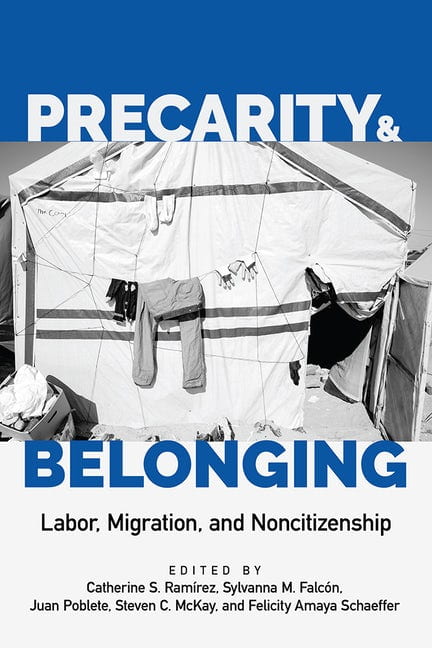Faculty and graduate students affiliated with the Dolores Huerta Research Center for the Americas produce new knowledge and engage our world via their research. This published work adds to public debate, informs policy, and is used as teaching tools at and beyond UC Santa Cruz.
The Huerta Center invites faculty and graduate students to contribute to our Open Forum and Research Report publication series, both of which promote community engagement with topics important to the Huerta Center. The Research Reports present accessible, data-driven research, while the Open Forum offers a space for commentary on research and current events in a less formal manner. We’d love to hear what you’re working on!
If you are interested in learning more about contributing to our publication series or presenting on your work at a research brown bag, please email us at dhrcamgr@ucsc.edu.

Open Forum
Research reports
Spring 2025
- “The Latina Wage Gap in Santa Cruz County” by Dr. Veronica Terriquez and Dr. Sylvanna Falcón, in collaboration with the Latina Futures 2050 Lab and the UCLA Chicano Studies Research Center.
Spring 2022
- In the spring of 2022, The Dolores Huerta Research Center for the Americas at UC Santa Cruz and the Human Rights Center at UC Berkeley School of Law convened a series of experts in a public event titled “Holistic Security and Early Career Human Rights Researchers: Inspiring Industry Change.” This convening focused on how both individuals and organizations could improve their understanding of “holistic security” and apply that knowledge via processes and practice, particularly in the workplace. Read about the convening in our report.
Summer 2020
- “Chile at the Threshold” by Human Rights Investigations Lab for the Americas, UC Santa Cruz students Yoselyne Cerros, Emma Chaidez, Monica Estrada Arias, Francesca Romeo, and Angie Valencia.
- “Germán Aburto” by Monica Estrada Arias and research team Angie Valencia, Yoselyne Cerros, and Emma Chaidez and graduate student mentor Francesca Romeo.
- “Human Rights Crisis in Chile: A Digital Inquiry” by Human Rights Investigations Lab for the Americas, UC Santa Cruz students Marian Avila Breach, Juan Castañon, Leo S. Fernandez, Kayla Gomez, Josue Perez-Hernandez, and Angie Valencia as well as the Human Rights Center at the University of California, Berkeley students Rachael Cornejo, Shakiba Mashayekhi, Gisela Perez de Acha, María Isabel Di Franco Quiñonez, Samantha Rubenstein, Danielle Cosmes, Lili Siri Spira, Lily Lucero, Kellie Levine, and Eliza Hollingsworth.
Spring 2020
- “Youth-led Civic Engagement and the Growing Electorate: Findings from the Central Valley Freedom Summer Participatory Action Research Project” by Veronica Terriquez, Associate Professor of Sociology, Randy Villegas student of Politics, and Roxanna Villalobos Ph.D. student of Sociology.
Winter 2019
- “Youth Participatory Budgeting in the Americas” by Jessica Taft, Associate Professor of Latin American and Latino Studies, and Daniel Rodríguez Ramírez, graduate student of Psychology and designated emphasis in Latin American and Latino Studies.

Submitting publications to Huerta Center
Open Forum
Huerta Center’s Open Forum presents scholarly dialogues and commentaries from Huerta Center faculty and graduate student affiliates on focus areas of interest to the research center. View the most recent contributions on our blog.
The focus areas include, but are not limited to, the following: Chicanx, Latinx, and Latin American, migration, cross-border/hemispheric, and human rights studies.
Anyone interested in proposing a submission can email huerta@ucsc.edu for more information. If selected, your submission will appear in the Huerta Center’s quarterly newsletter, social media, and on the website.
Submission: 1K-2K words, 12-point font, single space. The deadline is agreed upon in advance between the author and the Huerta Center director.
Research Reports
The Huerta Center publishes publicly accessible reports to promote data-driven research conducted by UCSC faculty and graduate students to enhance the public’s understanding of the Huerta Center’s focus areas. The focus areas include, but are not limited to, the following: Chicanx, Latinx, and Latin American, migration, cross-border/hemispheric, and human rights studies.
Anyone interested in proposing a submission, should email huerta@ucsc.edu for more information. If selected, the Huerta Center report will be featured in the Huerta Center’s quarterly newsletter, social media, and website.
Submission: 4-10 pages, 12-point font. The deadline is agreed upon in advance between the author(s) and the Huerta Center director. The author will receive support from the Huerta Center in formatting and layout of the report.
Dolores Huerta Day Teacher’s Guides and Lesson Plans

In partnership with the Dolores Huerta Foundation and UCLA Chicano Studies Research Center (CSRC), Huerta Center Research Program and Operations Manager, Dr. Kim Vachon, and Professor Sylvanna Falcón (Huerta Center faculty director 2018-23) created and developed K-12 lesson plans that celebrate the life and legacy of civil rights activist, Dolores Huerta. The educational materials, which include lesson plans, instructor guides, slide decks, handouts, and other instructional resources, are organized into two age-appropriate collections that meet California state standards: Kindergarten through 8th grade and high school. The lesson plans focus on content central to the activist work of Dolores Huerta, such as labor organizing, civic engagement, supporting climate justice and LGBTQ rights.

Most recent books

Queer Emergent: Scandalous Stories from the Twilight of AIDS in Peru (Duke Press, 2025) by Assistant Professor Justin Perez explores queer subjectivites via HIV prevention work, economic and political shifts, and global health. Perez completed ethnographic research in queer communities to understand the role of storytelling in HIV prevention. This book comments on the global health goals to “End AIDS,” and how it is entangled with identity and social change. Funds from our Individual Faculty Research Award helped make this publication possible.

First Contact: Speculative Visions of the Conquest of the Americas (Northwestern University Press, 2025) by Associate Professor Zac Zimmer reimagines colonization and resistance through speculative fiction that draws on Mexican novels, Andean visual arts, and other media to construct an alternate world. It brings into question historical narratives about conquest by providing a decolonized lens of imagination that rejects imperial perspectives. This book has received support from the center through our Individual Faculty Research Award.

Precarity and Belonging: Labor, Migration, and Noncitizeship (Rutgers University Press, 2021) is an edited volume by UC Santa Cruz professors Catherine S. Ramírez, Sylvanna M. Falcón, Juan Poblete, Steven C. McKay, and Felicity Amaya Schaeffer. The chapters in this collection bring mobility, precarity, and citizenship together in order to explore the points of contact and friction, alongside a possible politics of commonality. This book emerged from discussions on migration and precarity at various Huerta Center public events on Non-Citizenship funded by the Andrew W. Mellon Foundation John E. Sawyer Seminar on the Comparative Study of Culture.









